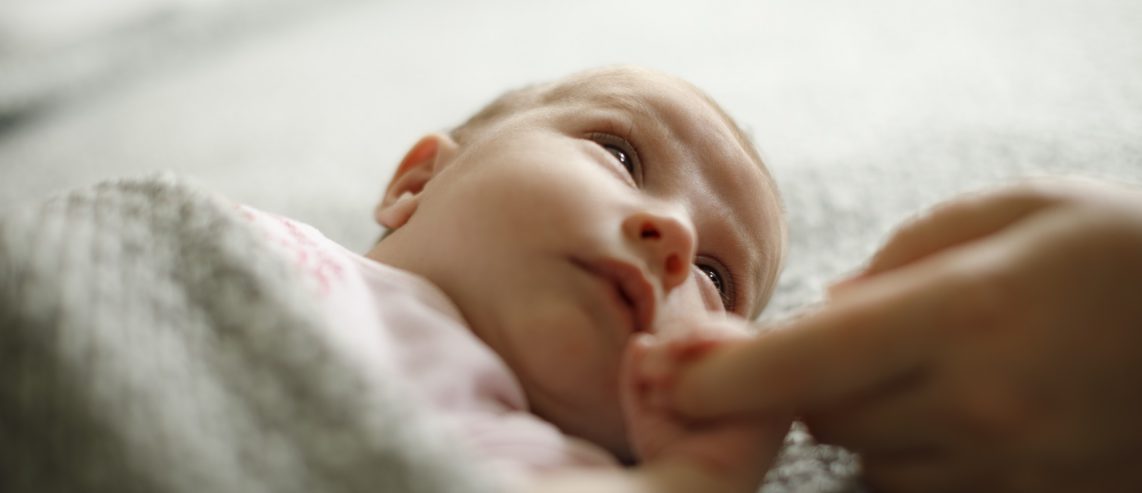Could your newborn baby be hard of hearing? And if your baby does have hearing loss, how will you know? Your baby won’t be able to tell you, after all.
Fortunately, current technology allows audiologists or a specially trained newborn hearing screener to check for hearing loss before your baby can communicate. Here’s what you need to know about newborn hearing screening.
Babies and Hearing Loss
Babies can hear sounds in the womb before they are born. That’s why their parents’ voices are already familiar and comforting to them shortly after birth.
But some babies are born with hearing loss, says the National Institute on Deafness and Other Communication Disorders. Two to three of every 1,000 American children have some hearing loss in one or both ears at birth.
Newborn hearing screening programs currently operate in all U.S. states and territories. About 98% of infants have their hearing screened before one month of age.
Never Miss a Beat!
Subscribe to Our HealthBeat Newsletter!
Thank you for subscribing!
You can now select the specific newsletters you'd like to receive.
You are already subscribed.
Subscribe to more newsletters in our email preference center.
Sorry, an error occurred. Please try again later.
Get Healthy Tips Sent to Your Phone!
What Happens During a Newborn Hearing Screening?
Doctors will check your baby’s hearing before you leave the hospital or birthing center. Catching hearing loss as soon as possible can help doctors know how to work with your baby.
Two different tests are used to screen babies for hearing loss. Neither will hurt the baby. Your baby may even sleep through the tests.
- The otoacoustic emissions (OAE) test shows how the ear responds to sound and only takes minutes to perform. Doctors will insert a soft earphone into your baby’s ear canal. It plays audio and looks for the response that should occur when the ears detect sound.
- The auditory brain stem response (ABR) test is more time-consuming and sometimes used as a follow-up to OAE. Your baby will wear tiny earphones and electrodes placed on their head. The test shows how the auditory nerve and brain stem respond to sound.
Why Is Newborn Hearing Screening Important?
The earlier audiologists discover hearing loss in an infant, the better. They can begin working with appropriate specialists sooner, and your baby will be less likely to have problems communicating in the future.
Babies learn the foundations of language (spoken or signed) in the first three years of life. Their brains are developing the skills to communicate. Children with hearing loss will develop better language skills if they get diagnosed and receive aid earlier.
How to Test Newborn Hearing at Home
Even if your baby passed their newborn hearing screening in the hospital, watch for any signs they may not be hearing well. Sometimes hearing loss shows up as babies get older. Babies are at higher risk of hearing loss if:
- They had complications at birth.
- They were born prematurely.
- They have had many ear infections.
- Hearing loss runs in your family.
Even though your baby can’t talk, you can look for signs of possible hearing loss. Look for these milestones as your baby grows.
- As a newborn, your baby should startle at loud noises.
- By three months, your baby should recognize and turn toward your voice.
- By six months, your baby should turn toward a new sound and begin to repeat sounds.
- By 12 months, your baby should babble and respond when you speak their name. They may even say a few words like “Mama” and “Dada.”
Contact your pediatrician if you notice signs that your baby may not hear well.
What if My Baby Has Hearing Loss?
If a newborn hearing screening indicates that your baby doesn’t hear well, your pediatrician may recommend a pediatric audiologist that specializes in evaluations and management of hearing loss for children. They may also refer you to a pediatric ear, nose, and throat specialist.
If your baby has hearing loss, treatment could include:
- Hearing aids.
- Cochlear implant surgery.
- Assistive devices that work with hearing aids or implants to reduce background noise
- Speech therapy.
Fortunately, with current technology, hearing loss in babies can usually be caught early. You can get your child the help they need to communicate well as they grow.
Sources
CDC, Hearing Loss in Children, Link
CDC, Newborn Hearing Screening, Link
CDC, CDC's Progress in Detecting Infant Hearing Loss, Link
American Speech-Language-Hearing Association, Newborn Hearing Screening, Link
National Institute on Deafness and Other Communication Disorders, Your Baby's Hearing Screening and Next Steps, Link
Kidshealth.org, How Will I Know if My Child Has Trouble Hearing? Link
About Pediatrics
From nutrition to illnesses, from athletics to school, children will face many challenges growing up. Parents often will make important health care decisions for them. We hope to help guide both of you in that journey. UPMC Children’s Hospital of Pittsburgh is a national leader in pediatric care, ranking consistently on U.S. News & World Report’s Best Children’s Hospitals Honor Roll. We provide expert treatment for pediatric diseases, along well-child visits, urgent care, and more. With locations across Pennsylvania, Maryland, and West Virginia, you can find world-class care close to home. We also work closely with UPMC Magee-Womens Hospital, a national leader in care for newborns and their mothers. Our goal is to provide the best care for your children, from birth to adulthood and beyond. Visit our website to find a doctor near you.
